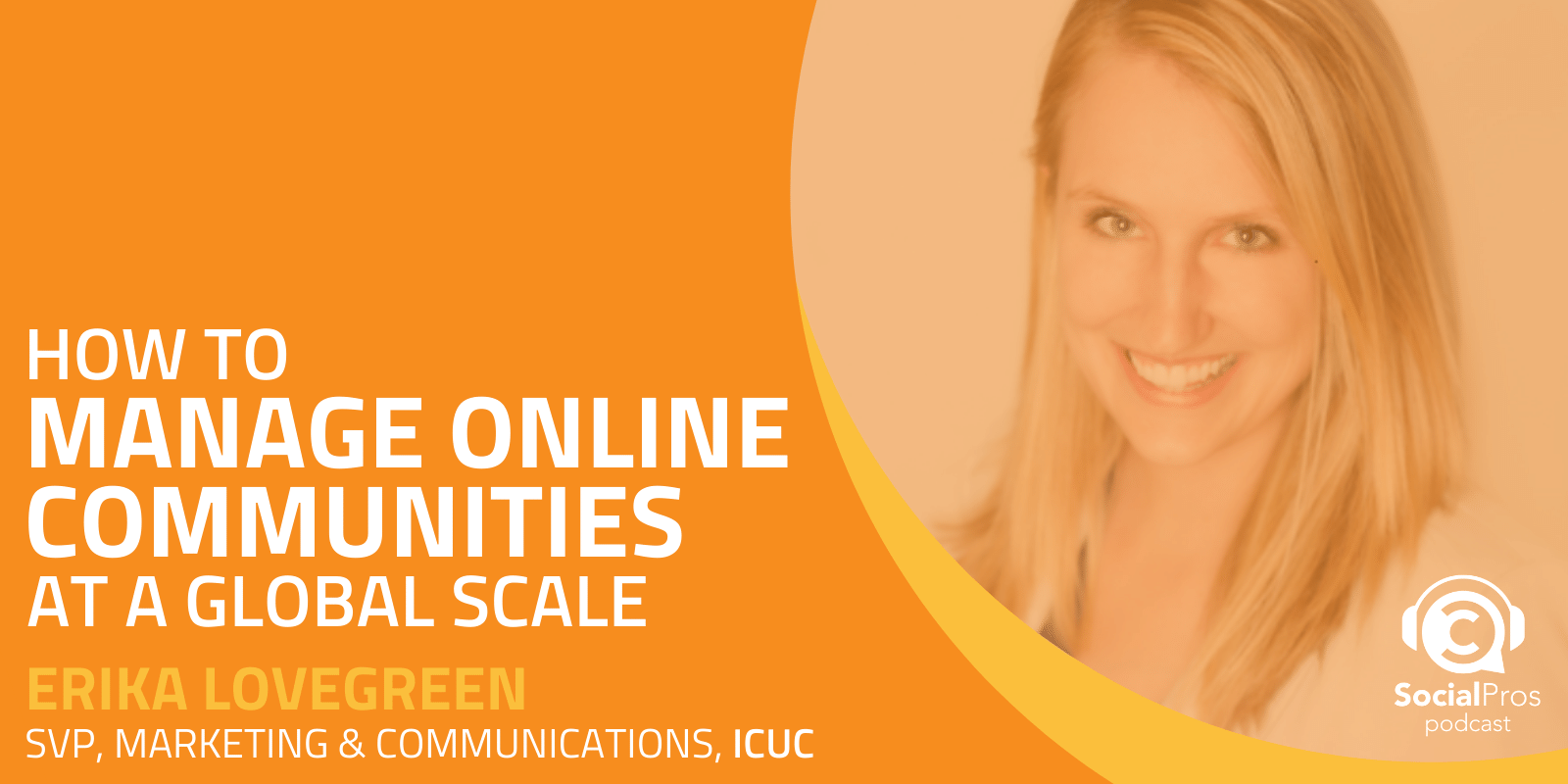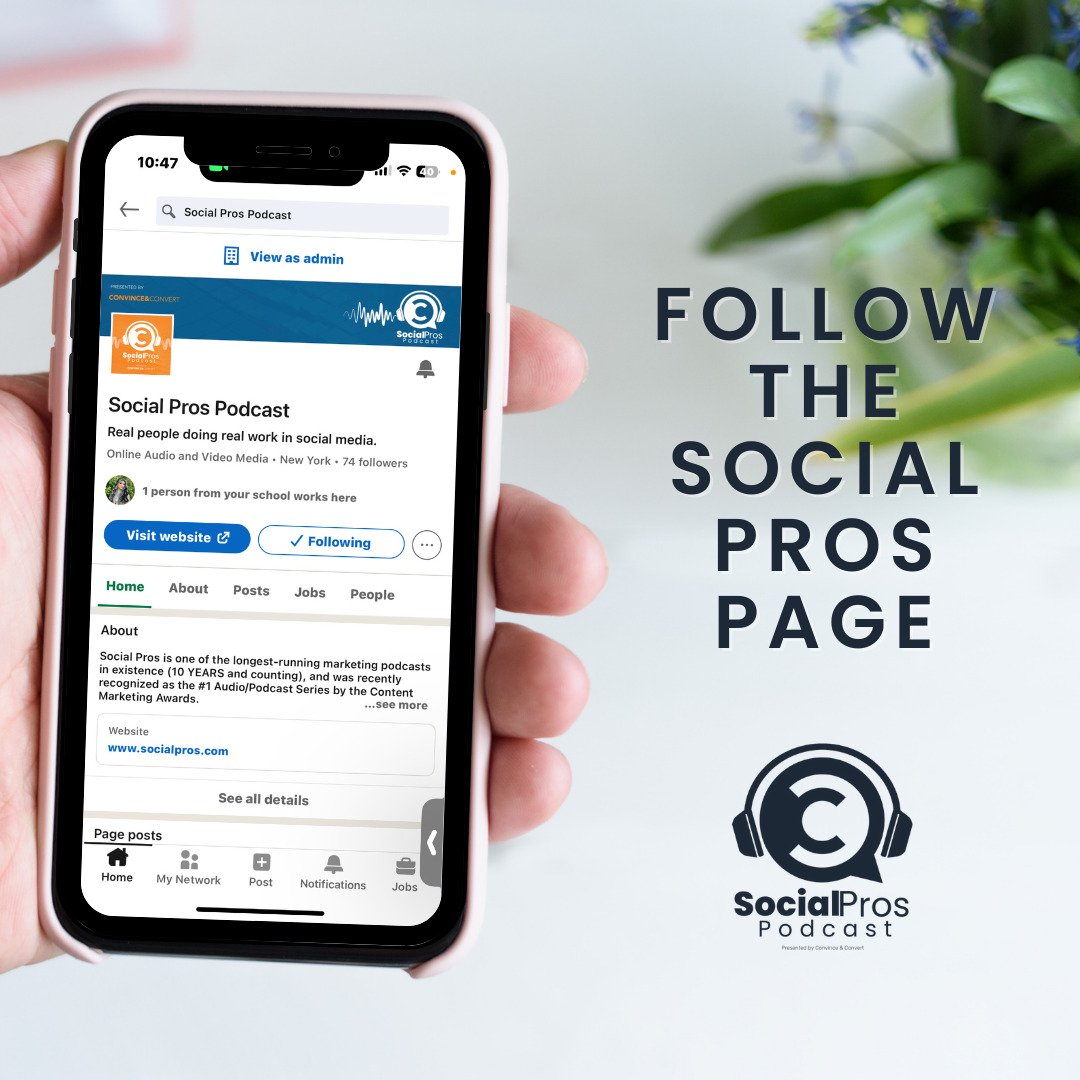Hosted By
About Social Pros Podcast:
Social Pros is one of the longest-running marketing podcasts in existence (10 YEARS and counting), and was recently recognized as the #1 Audio/Podcast Series by the Content Marketing Awards.
Our purpose? Making sure that we speak to real people doing real work in social media.
Listeners get inside stories and behind-the-scenes secrets about how teams at companies like Google, Reddit, Glossier, Zillow, Lyft, Marvel, and dozens more, staff, operate, and measure their social media programs. With 600+ episodes, the Social Pros Podcast brings the humanity of social media to the forefront, while providing incredibly useful marketing strategies that listeners can immediately implement.
Follow Social Pros on LinkedIn.
To inquire about becoming a guest or show sponsor, please email our Executive Producer, Leanna Pham, at leanna@convinceandconvert.com.
Apple Podcast Reviews:
The Social Pros podcast has quickly become a favorite in my feed! I'm consistently impressed by the engaging conversations, insightful content, and actionable ideas. I truly learn something every time I listen!
@Arlie KThis is absolutely an awesome listen for anyone in communications or social media!!
@Will31CThis podcast has become one of my staple weekly podcasts for learning about marketing! Love the conversations that they have and it's always enjoyable and educational!
@Simonstone95Love the podcast - informative, in depth and spot on for any business size.
@MissTriathlon
Erika Lovegreen, the SVP of Marketing & Communications at ICUC, is on Social Pros this week to talk about the intricacies of managing communities in an ever-changing landscape.
Bridging the Gap Between Brands and Conversations
Erika Lovegreen, the SVP of Marketing & Communications at ICUC, has made “people” her business — whether it’s blurring the lines between community management and customer service or adapting to new trends/platforms to meet customer needs.
Erika kicks off with a little ICUC backstory, starting from their humble beginnings moderating WWE conversations via text messages to partnering with Forbes list brands. She also explains what it takes to offer their services efficiently on a realistic and scalable level.
We hear how changes in the digital landscape, as well as global events, have not just changed how audiences react but community managers as well. Erika also highlights the importance of learning to embrace a bit of discomfort and pushing boundaries as the social scene changes more rapidly than it has in decades.
In This Episode:
- 03:19- Erika explains what ICUC does
- 05:28 – The line between community management and customer service
- 06:59 – How the ICUC relates with their agency partners
- 09:01 – Why prioritization is important when managing clients at scale
- 11:36 – Erika’s take on the evolution of customers’ attitude over time
- 13:47 – Why empathy is vital for both brands and the communities they serve
- 15:55 – Erika breaks down the scoreboard of a typical interaction between ICUC and their clients
- 18:06 – How passion and logistics play into assigning staff to subject areas
- 20:47 – The advantage of specialization and forming the right partnerships
- 23:39 – How the social media age has changed the skillsets needed at ICUC
- 26:32 – Steps brands should take to ensure they have the right engagement strategies for the future
- 31:49 – How Erika’s background in healthcare feeds into her present role
- 34:12 – Erika’s advice to people looking to become social pros
Quotes From This Episode:
Every brand needs to get comfortable with being uncomfortable. Click To Tweet
“Whether a client taps into our strategy services or not, we’re a strategic partner —we’re here to give good brand guidance.” @eelovegreen
“What makes us special is that we can help foster engagements, pull data, and really understand what’s happening there — in the end, that really helps agencies chart some of their best content ideation.” @eelovegreen
Resources:
Episode Transcript
transcript was exported on Feb 25, 2022 – view latest version here.
Lovegreen:
channels. Your fans are really, and your customers are really expecting more instantaneous responding and engagement. And then you have other channels that maybe there’s a little bit more of a wait time. That’s acceptable.
Baer:
tell you what Anna Hrach our guest this week nails, it it’s a challenge to be working with customers on the front lines of social media and meeting their ever escalating expectations around speed and responsiveness.
Hrach:
is a full time job, a lot of responsibility. It’s it’s, it can be a pretty intense task. But Erica walks us through, you know, exactly how they do it at ICU C and some best practices and some advice. I mean, she packed so much great insight and advice into this episode. It’s a fantastic one today.
Baer:
is a great episode. Erica love green is the senior vice president at ICU C and they specialize in community management online for dozens and dozens and dozens of major brands all over the globe. What a, a crazy job. And they do it with with excellence and and surprising good humor. As you’ll see, in this particular episode of the show, you will learn a lot in this addition of social pros. You’ll also learn a lot. If you download the social pros 500 ebook that we put together recently for you, we took all the highlights of the first 500 episodes of this show, put ’em into one downloadable PDF just for you ideas and best practices and advice from some of our favorite guests going back 10 years, download it. Won’t cost you anything go to Bitly slash social pros, 500 B I T Doy slash social pros 5 0 0.
Baer:
you can do a lot worse than downloading the state of marketing report from Salesforce. This is in my estimation, one of the most important pieces of research in the last 12 to 18 months, they went out, got in size from more than 8,000 marketers from around the globe to determine what really matters today. Because as you know what mattered yesterday is a little bit of a different story after the little bit of a pandemic thing, grab it. It’s really interesting, several different sections of inquiry, all of which are gonna matter to your job. Go grab it. Bitly slash state of marketing report B I T Doy slash state of marketing report. All right, here we go. She’s a friend of the program soon to be your friend as well. It’s Erica, Lere from ICU C here on social pros. Erica love green is the senior vice president of marketing communication at community management superstar global agency. I C U C Erica. Welcome to social pros.
Lovegreen:
you for having me. I greatly appreciate it.
Baer:
would love for you to start off our time together here on the show describing for the audience, what I C U C does, and maybe a little bit of the history of the company, because y’all are OGs in, in this social media community management world. And I’d just love to get a little back for the audience.
Lovegreen:
really happy to get it. I think OG is a great place to start. We have been doing believe it or not digital community management for 20 years. We started in very humble Canadian roots and basements moderating text message com conversations for the WWE brilliant sort of brought us into the news landscape where we know that there was a lot of commentary on news websites. And of course the natural progression of that you get into social media. And now I think it’s fair to say, forums, text messages, channels live streaming platforms. You name it the best way to describe ICUs, truly we’re engagers. We are that 24 7 solution to handle that social and digital commentary. We’re here to community build. We’re here to solve customer questions. We’re here to talk. We’re here to bridge the gap between that he, that conversation and that brand. And and really, I think we solve know a major challenge, which is people are talking and they want to feel heard. So it’s really been an exciting space to play in. And the, the world has really been our oysters, new platforms, new channels have continued to emerge,
Baer:
you’re doing that kind of digital community management for a lot of major brands drop drop in for us.
Lovegreen:
believe it or not, Jay, we just checked and we are actually helping 25% of the top 50 Forbes Forbes list brands. So we have many major enterprise businesses. But we’re not limited to that either. Really anyone who has social commentary and needs support we’re really here to help with, but we’re very fortunate some of the biggest brand names from Google to Macy’s to JP Morgan, chase, Unilever, you name it. We’re very fortunate to have really strong partnerships, some even 10 plus years,
Baer:
does community management stop and customer service start or, or is that the same thing in terms of how you provision services for your corporate clients?
Lovegreen:
know, for us, I think we really treat it the same. I think it really just depends on the goals that you have. I think it’s safe to say that some channels your fans are really, and your customers are really expecting more instantaneous responding and engagement, and then you have other channels that maybe there’s a little bit more of a wait time, that’s acceptable. So you really need to dig deep, a brand needs to dig deep on their goals and establish how their audience and how their community, what, what the community’s desire is for that response time. If you’re a brand or a service product, you know, you’re offering a product, obviously there’s a lot more, I think customer inquiry and FAQ and sort of a need for answering questions. And you may wanna speed up those response times in other situations that you’re really community building and crafting conversations. There’s a little bit more leeway because you have a lot of people digging in and talking, and sometimes you just wanna listen for a minute before you jump right in and respond. So again, I think they are a little bit treated differently, but can also be treated the same, really just digging in on what is best for your audience. And that can help be a north star as making, as you’re making those considerations.
Hrach:
Erica, you obviously have your own dedicated clients at I C U C, but then you also partner with agency clients as well. Just curious what that looks like and what agencies are tapping into you for, and kind of where they’re seeking some help for their own clients too, when it comes to community management.
Lovegreen:
we absolutely love our agency partners because what oftentimes happens is that an agency has a couple really big clients and they wanna be a one stop shop for the brand partners they’re working with. They also want more community insight. I think what makes us really special is we can layer on to that team. We can really help foster the engagements. We can sort of pull data and understanding from what’s happening there, and that can help an agency, especially creative agency chart, some of their best content ideation. I think we’re really part of that strategic picture, but we’re the advocates for the community. We’re the voice of reason. We’re the ones living in breathing in it. So what better superpower than the creative agency making the pretty pictures and ideating these amazing campaigns than to partner up with those of us who are gritty and scrappy and living in the conversations and in the communities. I see us as a content optimizing play and organization that we can really keep that content and, you know, growing and really learning continually learning from the audience. And then again, it really helps us build new content streams. It helps us really speak to the fans more strongly when we’re working together. So love our agency partners, some of my favorite work, amazing, amazing strategic ideas are really built within that environment.
Baer:
I wanna ask you a follow up question about what you were saying in the area of response times per platform, per client, et cetera. Is it more likely that you are encouraging your clients to allow your team at ICU C to respond more quickly or do your clients more often have somewhat unrealistic expectations about what you can actually do in terms of response time? How, how much do they prioritize speed generally versus sort of community management and engaging in humanity and empathy, et cetera.
Lovegreen:
know, I, I think there are a variety of different factors that go into some of that decision making. So you have to think about scale. You need to think about volume. You need to think about prioritization. So, you know, if you have a majority of your audience on one channel, and there’s a higher expectation that in that channel, you’re responding more quickly, you may wanna have your resources really in that channel. And maybe you can afford some of the third party channels not to respond as quickly. So I think, again, it’s not a super perfect arrow answer because there’s, I think a lot of customizations go into that. There are definitely best practices at play. Obviously consumers are becoming more, they’re adapting to an environment where they’re expecting more immediate responses. So we’re here to manage expectations. I think there’s some automated ways that you can sort of send that message that someone will be with you in a peer, a set period of time, and that can help bridge some of those gaps.
Lovegreen:
we also really need to think we’re living in a world where our gen Z audience is evolving to live streaming platforms. They’re used to instantaneous and we’re gonna have to become more and more accustomed depending on how that continues to evolve into meta versus and spaces. We’re just gonna have to become really accustomed, probably speeding up those response times and taking some more considerations to that as those grow. So again, not a perfectly straight and narrow answer. It’s very dependent on the goals and on the main channels that you’re focusing on. But like anything else I don’t think you should spread yourself too thin and be really delayed in response, you know, sort of, we need to hone in on some of the priorities and where your audience is living and breathing, and then maybe we can supplement some other places to still keep our keep our audiences happy.
Baer:
I don’t know that this is mathematically true, but it’s probably true that I see you see interacts with more consumers online than any other organization in the world on a day to day basis. That being the case, it is certainly my perception. And I think this is probably accurate for a number of us that the tone and tenor of consumer interactions has gotten a little course over the last couple of years that that people are maybe not quite as kind or patient as they may have been in the past. And maybe that’s just me being an old man shouting at clouds, but I’d love to know what you and your team at ICU see feel about that are, are customers just angrier than they used to be.
Lovegreen:
know, it’s, it’s kind of topic dependent. I think that there’s definitely some topics that seem to strike bigger chords or frustrations you know, a around various, obviously the political landscape in north America has, I think created some U unique challenges and some unique moments. But I also think a beautiful thing has happened that if you are meeting those customers, you’re responsive to them. There’s a great appreciation for that too. And it can really turn that sentiment into a more positive direction. So do we see spicy fiery conversation? Absolutely. Do we have interactions where they’re not, you know, pretty and pleasant? Yes. And we work with our brand teams on how we evolve and how we talk and how we engage in those moments and what we actually engage with and what we may be advised to or don’t do anything. But I also think that there’s so much more, you know, more people are going there and brands are really caring about this space more than ever. So I’d almost argue not that the opposite is happening, but I’d argue that this beautiful thing that is happening, that brands are really caring for this space more than ever. And so you’re getting better customer service, you’re getting better engagement, you’re getting more timely responses and that’s actually helping the problem not hurting the problem of, you know, a landscape where, you know, outside of our, our online time, I think people are stressed and tired and frustrated
Hrach:
outta curiosity, along those same lines. You know, community managers are the frontline for a lot of those, those conversations. And some of those, you, you know, intense conversations sometimes, you know, some of them are great, as you mentioned. And some of ’em are a little bit spec or a little bit more tense or te something that we’ve heard consistently and repeatedly on the show from other social pros is just this level of burnout and, you know, being on, and, and especially with community managers, it feels like they’re really susceptible to this because they are the front lines. How are you helping to mitigate this? Or what advice do you have for people who are, are doing community management 24 7, and really just feeling the tax of those conversations?
Lovegreen:
absolutely, you are spot on that right now. The weight of burnout feels very strong and very real, you know, one of the creative things that we’ve done on our side di really try to help our team. We created a pool of content specialists that can plug in to give some more time off, you know, just being able to supplement when someone raises their hand and says, I can’t today. We’ve also created optout policies. Look, there’s content that just comes in and it’s affecting differently. We have to have grace, we have to have space. We need to have a level of understanding for one another that our personal lives are evolving and that wasn’t maybe what we thought it was gonna be when we got into all of this. And just human to human outside of, I think the professional, you know, guardrails that we’ve put in place for our team.
Lovegreen:
think we really, you need to come together and have empathy for both sides of the fence. There needs to be empathy for the person that’s flagging their frustration with a brand or with a product or with, you know, whatever they’re reaching out for. But then we also need to take care of, you know, ourselves personally and find what personal care is. Someone told me once personal care is not just taking a shower, going to the grocery store. It’s something that’s different for every single person. It could be as simple as having someone clean your house every couple weeks. That’s your personal care? I think we really do need to care for ourselves. I think businesses, we have tremendous responsibility to, to put in some of those guardrails. So I’m proud of the ones that we’re doing on our side, but again, I think we need to be teaching and practicing empathy on both sides and, and working through that as well.
Baer:
question I have for you, Erica, about ICU C’s work with clients, do you suggest to your clients what the appropriate KPIs should be for your work or, or do they demand KPIs of you? Right? Is it, is it always about how many interactions did you have or is it about the outcome of those interactions? So what what’s kind of the scoreboard for a typical ICU C engagement? It
Lovegreen:
would say the typical client, the scoreboard scoreboard say that 10 times fast that it’s definitely gonna be more of a volume space. You know, we’re really here to help that need of there’s so much social commentary and we really wanna help them, you know, get through it. However, we do have a whole strategy side of our house where we really are trying to work on shifting sentiment. We’re really trying. So we’re setting up, I think, KPIs with the clients very, very early on, we’re looking at our brand voice. How do we evolve that? And whether a client taps into our strategy services or not, we’re a strategic partner. We’ve seen a thing. We’ve done a thing we’re here to, I think, give good brand guidance. We put ton of points of view on that we dig in with specific clients, have a lot of meetings review sort of their process for engagement, their process for escalations, what, who needs to see what, when, so we wanna continue to evolve that we have a suite of reporting too.
Lovegreen:
I think you’ve gotta be looking at a lot of different metrics. And I always say, if you’re not doing it with us, you’ve just be doing it. So regardless, you know, any community management efforts you’re due, it can’t just be, just be about the volumes, even though that’s the service we provide, cuz it’s a need that you have to get the volumes down. It’s always gonna have to be guided with, with strategy, with a brand voice adaption evolution and ultimately, and, and following metrics along. And that’s how you’re gonna really make sure that you’re capitalizing on this incredible opportunity of community. And it’s not just gonna be this thing. That’s not really presenting ROI.
Baer:
question about staffing. You, you mentioned earlier, you have so many different clients across so many industries, you’re doing pharma and I don’t know, ferrets you doing a do far at work, probably sort of pet company far, far to ferrets. We’re gonna go with that. And when you’ve got a team member who was a community manager, a responder, if you will, are they just on Macy’s or do they get cross trained across multiple brands or maybe they are particularly good at pharma, so they can do multiple pharma companies. How does that work? Like how much sort of subject matter expertise does somebody have to have in that category of business?
Lovegreen:
know for starters, subject matter expertise is always gonna be important to us. I think, listen, we, we kind of joke in our sales process, you wouldn’t put a gamer on your Disney account, you know, your Disney mom’s panel. Like we wanna marry passion with the accounts that we’re doing, cuz that’s gonna get someone excited and up every day and authentic when they’re really expressing this brand voice that they’re embody. That being said from a staffing perspective, we’re a logistics company. The very end of the day, the logistics of scale and masterful community management across all these channels. All these platforms has to come down to a certain level of logistics. And for some accounts it’s really gonna be a customized approach depending on your need. Some counts need all in because they want that real time engagement. They want 24 7 across multiple languages, and we’re gonna have to sort of pull that all in, but if it’s a, you know, smaller need, maybe it’s just one channel it’s it’s DMS on Instagram and we just need, you know, some coverage of that.
Lovegreen:
we have a, you know, someone who could help cover and support who has a passion for that specific business or industry, we might pull them for a couple hours. So we take care of the logistical challenge that really exists across all of these panels chat platforms globally so that a brand can flex and scale and grow and crisis happens. And we’re able to, you know, flex up. I think about some of the like smaller language needs, like Zulu, how many clients might need Zulu. We can maybe do some efficiencies in sharing and it keeps your staffing costs down when you’re a global, you know, corporation or enterprise business business. You really need to look at how we’re doing that efficiently. And that’s why it makes sense to outsource and work with someone like us, cuz we’ve solved that problem. We’ve created that master new of an system. And that’s where a lot of cost savings has been reported back to us.
Hrach:
know, Erica building off of what you just said, which a hundred percent it’s, I’m also hearing this, you know, bigger theme and I’ve seen it consistently, which is that a lot of organizations and even a lot of agencies feel pressure or to do it all and be it all and be the experts at everything. And sometimes that’s not always possible whether it’s resourcing or maybe it’s just, you know, skillset or you know, and I really love this kind of point that you keep touching on, which is that, you know, you don’t have to be the expert at everything. And, and that’s really where I C C comes in and helping to build out some of that. And I don’t know. It’s just, you feel that, that do you see that same pressure where they feel like, oh, we have to tap into somebody. And so therefore we might not be as good as we think we are, but I don’t know. It just seems like a, a really good running theme would
Lovegreen:
to get your thoughts on that. Yeah. You know, I think it’s one of those things. Every business has a mission that you wake up every single day and you are hungry to get up and do and serve that mission. You’ve got SAS platforms like a sprinkler who gets up every day and says, I wanna be the absolute best tech platform for social media at management. We get up every single day and say, we wanna be the absolutely best at community management and digital customer care bar none. And so we work and we’re tireless about it and fierce and, and unwavering in that mission. And I think that there’s just a lot of strength in partnering. If, you know if a re it wants to be the absolute best at making chicken wings, stick to that and tell your story, but let us really set that into motion and overdrive because we have the experience and the breadth and the understanding of the complexities that go into this social landscape and into this platform landscape it’s evolving.
Lovegreen:
is the wild west. It is very, very over and to stay on top of all of it. Again, stay on top of cooking, the best chicken wings, let us stay on top of cooking, the best recipe for your community management. And again, you’ll have a lot of time back. We can get that low hanging fruit in your community management and customer service too. So that you’re really creative people. We get this know all the time. I’m prompting myself with a question, but you get this all the time that are you taking work away from a social media manager, community manager. We have a person in house who does this. We’re here to take that low hanging fruit from them. If that’s the need, let us escalate those like Wendy’s moments to that person so that they’re not wasting time in the FAQ stuff. Let us take care of that for you.
Lovegreen:
they can do those Twitter battles. They can do those more creative moments on TikTok. They can be that sort of brand that’s out in front. You can’t do that. If you’re one person trying to do too many things or covering all of those spaces. So again, we’re, we’re here to provide efficiencies and compliment all day or do it all. If you need to do it, we love that too. But the point is, you know, no one can do it all, but we do wanna be experts in this space. We research we’re diligent, we’re proud. And and it takes, you know, we want you to be the experts at what you’re the experts at. And we compliment each other
Baer:
with more and more social networks moving toward multimedia. Does that change the skill sets that you ultimately need to have on your team on the front lines? Do you have to start get to the point where you’re responding with gifts or videos or dance crazes or, or is it still largely text base and, and kinda put on your crystal crystal ball hat? I just mixed two metaphors there. And then tell me, tell me what you think is gonna happen over the next couple years in that regard.
Lovegreen:
I think, listen, we started out moderating WWE conversations on text message. There’s a ton of flexibility that has to come with how consumers interact in spaces and in brands and how people talk to each other. We see some of we’re seeing some of those evolutions already where, you know, some brands are adding in their playbooks gifts or certain flexibility in how they wanna create approach. We have new emoji libraries emerging, what feels like every single day or rules, just rules of play for D E I and B. You know, there are just things that we need to consider as we continue to evolve. I think our goal is to, you know, always find, or not only look into our own team to really help, help evolve them and find opportunities for them to continue to train, develop, grow, try new accounts, but ultimately, you know, the staff that we hire as we get new projects, we’re going to obviously dip our toes into that water too.
Lovegreen:
there is a world I really do believe again, my eight year old has, has Minecraft. Like the school gave him Minecraft. We had of that generation coming up very in tune with living in different spaces and the interactions that they’re expecting and what speaks to them and the style and the look and the feel is just evolving and it’s different. So every business who’s in this space is gonna have to continue to evolve with it. But again, I mean, a year ago who would’ve thought TikTok was where it was. And yet here we are, we’re engaging with creators every day and we’re trying to really, you know, get their audiences and their voices heard. So we’re not afraid of it. We’re excited. And and I think crystal ball, we all need to look into the crystal ball, take it seriously and prepare.
Hrach:
I have a follow up question that as well. I, I have several follow up questions that I would love to ask about the WWE origins, because I find that world endlessly fascinating for so many different sociological reasons, but I will refrain from those questions on this specific episode. And instead, I’ll go ahead and say, speaking of evolution, you gave a 20, 22 prediction to content marketing Institute. And part of your quote, I won’t read the whole thing. It’s a really great quote, but basically you said the metaverse is not just a passing phase branch should be building community management strategies. Now at its core, the future of an evolving metaverse reinforces the notion that online human connections are here to stay. So of course you had just mentioned that, you know, a year ago, we didn’t even think that TikTok was going to be as big as it was or that, you know, the community engagement and management was really going to be as big. And you’re already talking about metaverse. So what steps, knowing the trajectory and knowing that they’ve given us this heads up, that this is where everything is going, what steps should brands be taking today to make that pivot and make sure that they do have those engagement strategies. Now,
Lovegreen:
know, I, this is an area I’m extremely passionate about for starters, every brand needs to just get uncom, like be comfortable being uncomfortable. I think that allocating a little bit of budget to dip your toes in, or allow your marketing team to try something a bit. Unconventional is gonna at least start getting some comfortability around the notions of things like NFTs or live streaming investment. I think it’s just starting to see how we fit. Is there even a fit in this space is a really great way to start seeing and experience experiencing what this could mean. You know, is there something to do at this very moment, like jump all hand heads in deep, I don’t necessarily think depending on your business and your needs and your goals that that’s necessary, but I also think we can’t deny the powerful impact that some of these trends, it they’re stickier than maybe we thought they were gonna be.
Lovegreen:
and I, I think you have to, I imagine where your unique value proposition may or may not fit into it. I was recently talking with a, a big pharma organization and they were really not sure about NFTs. It’s a kind of a passing phase, a lot of skepticism, but what I challenged them in thinking is that someone who has a disease area, you know, they feel stigmatized. They feel, you know, there’s a lot of maybe hiding what they have and an ease and uncomfortable in NFT is a perfect creative. I can be my full, true, authentic self in a version of myself, whether it’s in a gaming world or whether it’s in an NFT format, but this idea of just creativity and unveiling, your true, authentic self in a space that, you know, may not be as intimate as, you know, a face to face conversation.
Lovegreen:
just this untapped potential for unique businesses to really explore how they, how they get in on these trends. And again, I think it just starts by the business accepting that they’re gonna be a little uncomfortable, that they may or may not agree with. You know, the fact there’s a space for them later on, but we need to just know that there is a group of, you know, a demographic up and coming, you know, there are brands that don’t market to gen Z, they stay 10 foot, you know, 10 foot pole away from them, but that group is gonna age. We’re all gonna age. We’re all evolving. We also need to not dis you know, discount our baby boomers, and they’re added, you know, their ability to adapt to some interesting spaces and question. And they’re very curious even if they don’t get it, they’re very curious.
Lovegreen:
all, all that to say, I think we can’t ignore this sort of wave coming brands really need to make some considerations and allow their teams to do some testing, maybe five for percent at this point, maybe it grows to 10% next year, but really, really excited to see how creativity comes to play. I spoke with a coffee, a major coffee brand not that long ago out of Europe. And they were saying they’ve already hired a, a metaverse innovation specialist. I mean, what an investment, just to say, like, look, we don’t know where we fit yet, but we’re gonna let someone figure that out. So again, it’s, it’s just an interesting landscape we’re living in. And a lot of, a lot of big brands are really starting to make some of these considerations.
Baer:
not drinking coffee. The metaverse, I’m only drinking coffee in the real world. Cause I don’t know that the satisfying nature of virtual coffee drinking is gonna get it done for me at this point, but I’m willing to try get me mosted,
Lovegreen:
coffee is communal. So whether it’s like actually drinking it in the metaverse or sort of the notion of the, how communal it is. Yeah. You know, what kind of products are sort of advertised in this space and then created there that sort of make you want to actually, you know, act and, and bring that into another world. Super interesting. There’s also, there was an amazing case study of makeup company that sort of did up a gen Z gamer character with their makeup. You know, she was Mar wearing the makeup sort of in the metaverse to sort of promote that there is, you know, a, a brand that she believes in. So it’s all about creative creativity at this point. We don’t know where it’s gonna take it, but I really do commend that brand sort of saying, we’re gonna, we’re gonna connect it’s about connection at this point with an audience that maybe is not fully understood yet, but reaching an olive branch to say, you know, we wanna try, we wanna learn, we wanna make some end roads. We’re gonna make some mistakes. And some people adapt and some won’t, but for the, that are, we gotta reach our consumers where they’re at always
Baer:
you got into this space, your background initially in broadcast journalism after that in healthcare. And do you think your work in healthcare, which is very driven by empathy and caring for patients, do you think that positions you disproportionately well to be in an organization that that is rooted in caring for clients,
Lovegreen:
working in the healthcare space? And I was specifically in senior living. I never imagined my, my career journey taking me into this social landscape. Definitely not at the enterprise global level, the way that it does, but I will say there’s something so special about really understanding care and concern. And Jay, you pointed to empathy you know, when people are in the vulnerable state of needing healthcare services what they’re expressing and how they’re feeling and how that comes across and families and all the people and stakeholders that are all around there are surprisingly translatable to what I’m doing today. Not only that, but you know, as, as Anna said, we were the frontline, like community managers were the frontline unsung brand healthcare heroes of this pandemic so far. And again, having worked in a space with heroes, you know, healthcare heroes, it really has been truly amazing to kind of see how some of those skills have been able to pull over. And it it’s grounding for me. It’s human for me. And I’m so thankful beyond thankful that my stop in my journey was believe it or not with a senior living corporation. I’m, I’m so proud of every single one of those individuals who inspired me. I understand their strengths and I want to be a conduit to, you know, what, what that land overcomes every day and serves and the purpose. I, I love being able to bring that into the brand environment,
Baer:
how it all works out, right. Which is why happy to announce ICU C sponsor of a brand new WW E wrestling tournament in the metaverse. It’s gonna be incredible. Make sure you tune in. Yeah, it’s gonna be awesome. Don’t wait.
Lovegreen:
gonna have to get some some approvals I’m gonna have to,
Baer:
You’re a senior vice president. You can do it. Beg for forgiveness, not permission. It’s gonna be fine. Don’t worry. All
Lovegreen:
true there
Baer:
that. They said it’s okay. Erica would ask you the two questions. We ask everybody here on social pros more than 10 years. Now that we’ve been asking these questions going back to where all the questions were about like Friendster question number one. What one tip would you give somebody who’s looking to become a social pro?
Lovegreen:
mean, I have to just say, stay curious. I just think that curiosity, as you know, social media has evolved and grown into so many new spaces and has new offerings. And the definition of social media is evolving and changing before us. We need to stay curious, especially about people and how people behave. So I would highly recommend to, to constantly be looking for those opportunities is to learn, to grow, to get again uncomfortable in places that maybe aren’t your safe spaces. It might be a, you know, a place that someone else goes to engage and communicate who they are. But overall, you gotta be a curious individual to be really successful in this environment,
Baer:
in the out. It feels like the pace of change has really accelerated, accelerated again. It felt like it was slowing down a little bit, but now with so many new platforms like TikTok that are a little bit fundamentally different and now meta and everything else, there’s just a lot to contend with. So curiosity clearly a requirement for social pros. Great answer, Erica, last one for Erica every, and who’s the SVP marketing and communication at I C U C. If you could do a video call with any professional wrestler, who would it be and why? No. The actual question is if you could do a video call with any living person, who would it be and why
Lovegreen:
really got me there? I was about to say the rock, but I don’t know if he wrestles anymore. So, or Johns. I was kind of trying to go through my rap sheet of, of wrestlers who might not be wrestlers that are all actors. So bear with me. But you know, in think about this one, someone who I’m very curious about, I, I’m very curious about Elon Musk. I am just genuinely agree, disagree with some of his, you know, thinking and ways of navigating the world, the landscape innovation. We cannot argue that there have been definitely needles pushed and incredible. I think we’ve just, he’s accomplished some incredible things. He has some really, maybe extreme ideas sometimes about where consumerism is going and the human race, but I also admire that it doesn’t seem that there are limits and he really pushes those. So there is a lot of respect, curiosity, and I have questions for Elon Musk,
Baer:
espouses your stay curious mantra, I believe because nothing is off the table with Elon Musk. That’s for sure. And there’s something to be said for that, Erica, thank you so much for being here really appreciate you taking the time, congratulations to you and the whole team for all the out, any success at I CUC. It’s always great to catch up with you and we will talk to you again soon.
Lovegreen:
you. Great to great. Getting the opportunity to chat with you all as well.
Baer:
was a blast Anna. We will be back next week with another fantastic episode of what we hope is your favorite podcast and the whole world. This has been the social pros podcast. Don’t freak. Get every show going back to the very, very beginning transcripts, audio links, bonuses, nacho cheese, whatever you want. Go to social pros.com. See you next time.
EP 511 – Edited (Completed 02/24/22)
by Rev.com
Page of








